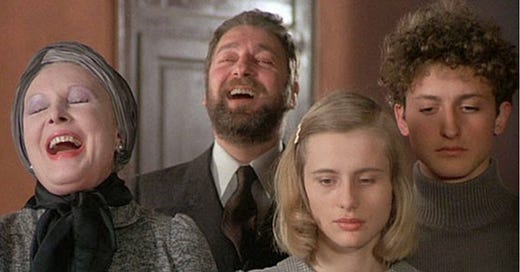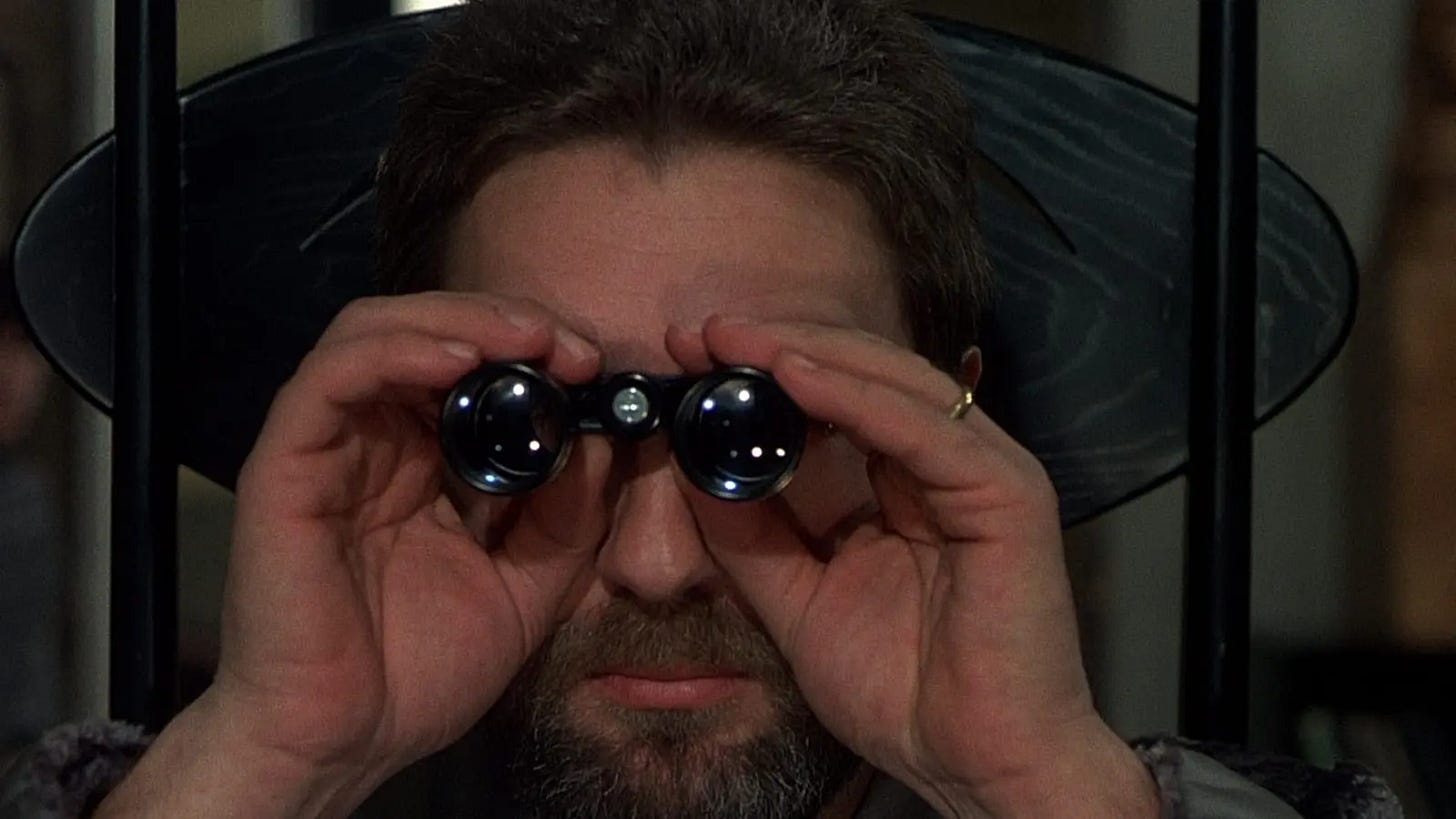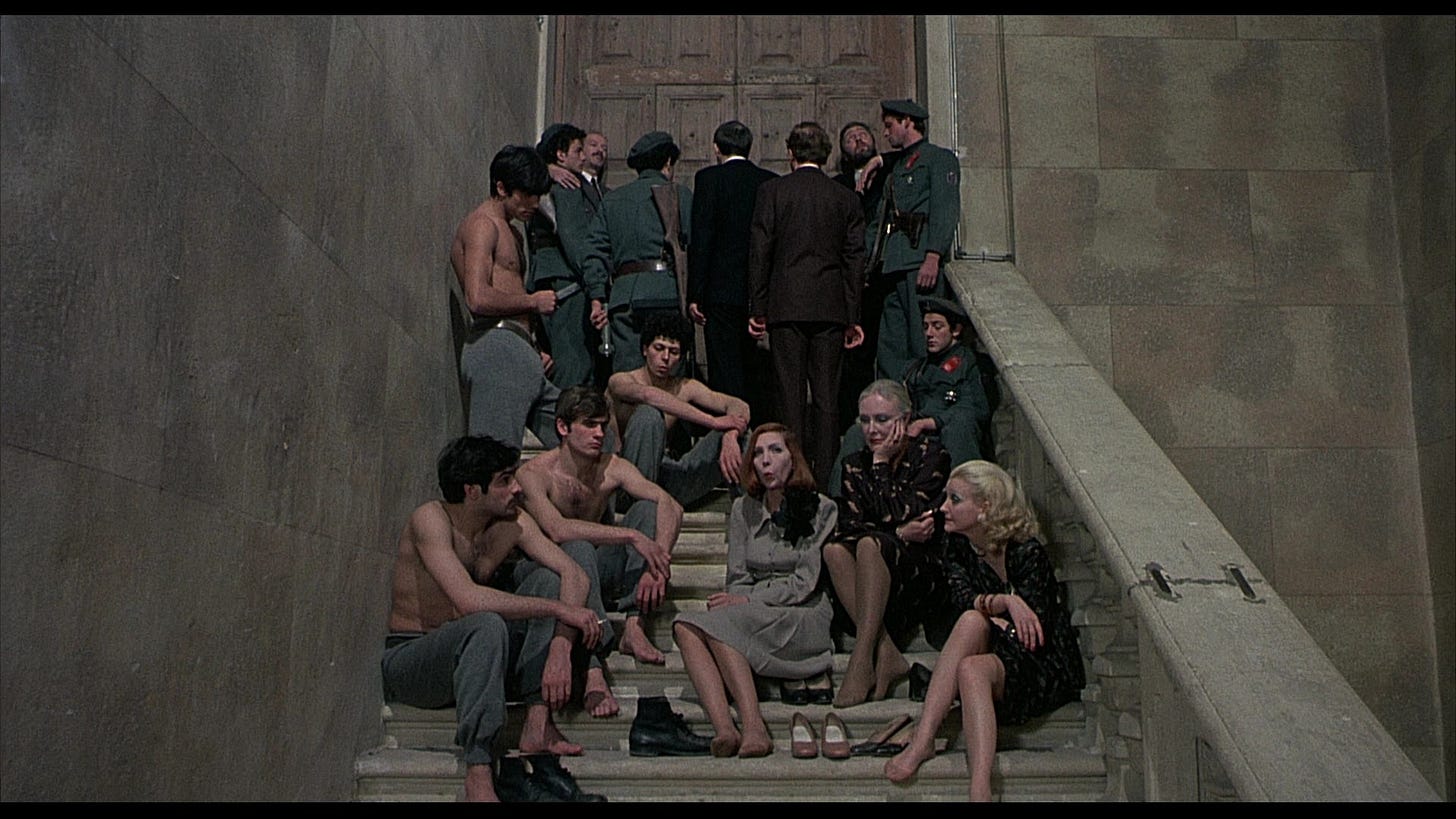As our culture continues its slow, aching bend toward acquiescence and accommodation of authoritarian power, ideas, principles, and propaganda, I will be writing about the lessons of representation of authoritarianism and resistance in cinema. Thanks for reading and please share if you are so inclined.
****
A note to readers: SALÓ depicts extreme acts of nonconsensual sexual violence. I do not describe those acts here, but reference them in general in order to understand them in relation to the film’s themes and ideas. Please be advised. Thank you.
****
In September of 1943, as the endgame of World War II began playing out in fascist Italy, the nation fractured— the south, undergoing invasion by the Allies and seeing the writing on the wall, removed the fascist dictator Benito Mussolini from power and imprisoned him, while the north came under the occupation of the fascist army of Nazi Germany. In a bold act of desperation, Mussolini was physically rescued from prison and installed as a figurehead leader in the North, collaborating with the Nazi regime to establish the separatist Italian Social Republic (RSI), with a puppet government installed in the small town of Saló, located near Brescia, on the shores of Lake Garda. Here, Mussolini and the Nazis undertook the deportation of Italian Jews and political enemies into the infrastructure of the Nazi death camps, among other wartime atrocities. Soon, seeing their nation invaded by the Germans and ripped in half, Italian partisans joined the Allies in the war for Italy until, in April of 1945, the RSI regime collapsed and Mussolini was captured and brutally executed, his corpse hung in the street for public display.
Pier Paolo Pasolini, a gay, working class filmmaker, artist, and poet, was born in 1922 in Bologna before his family moved to the town of Belluno, both ending up in the heart of the RSI. Despite a conservative upbringing, Pasolini served in the Italian army that fought the Nazi occupation1, and the experience of fascism and the capitulation of the middle class to fascist populism seems to have transformed him— after the RSI collapsed and WWII ended, he became an avowed Marxist and leftist, using his films and writings to attack the institutional power of the church, the state, and the petit bourgeoise2 that shaped Italian society. This included making films that pushed the boundaries of political discourse through what society deemed transgressive sexual situations, films that scrutinized the Italian class system (ACCATONE, MAMA ROSA, TEOREAMA), faith (THE GOSPEL ACCORDING TO ST. MATTHEW, THE HAWKS AND THE SPARROWS), and the roots of classical culture (OEDIPUS REX, THE DECAMERON, THE CANTERBURY TALES, etc), with many of his works landing him in legal conflict with the state, having been officially deemed “obscene.”
His final film would prove to be the one which brought all of these ideas together. SALÓ, OR THE 120 DAYS OF SODOM, an adaptation of the Marquis de Sade’s infamous aristocratic fantasia3 on the Libertine conception of “freedom”4, was met with immediate revulsion and subsequently banned from cinemas in countries around the world. Set during the time of fascist RSI control in Saló, the film swaps de Sade’s quartet of 18th century Libertine aristocrats for four fascist RSI officials who abduct a group of young people and subject them to physical, sexual, and psychological torture. Their “reveries” are inspired by the stories of four corresponding sex workers, whose tales of physical and sexual degradation are used as a framework for sadistic5 exploration, underscoring the hypocritical relationship between the state, its expression of bourgeoise values, and the violent debasement of the young and working class. Pasolini divides the film into four “Circles”, a nod to the structure of Dante’s “Inferno”, which describes the poet’s descent into hell.
Although it is known widely for its almost unbearable depictions of sexual and psychological violence, the crucial, defining element of SALÓ arrives not in its latter scenes of depravity, but early on, in the way the film establishes its power structures. First, we come to realize how the young victims of the fascist Libertines have been chosen— the children of political opponents, leftists disappeared from their communities, rounded up and delivered to the fascist leadership by their young, willing collaborators. Despite the film’s narrative emphasis on de Sade’s “position” in the story (that of a powerful man with innumerable violent sexual fantasies, exerting his power over the poor victims of his aristocratic avatars), it is impossible not to understand Pasolini’s position as being with the victims, the young leftists who are being subjected to hidden, state violence. The future of Italy to which he once belonged.
By showing us, with unprecedented clarity, the ways in which fascism uses violence and power to reduce individuals into vessels for the corrupt whims of individual state functionaries6, Pasolini uses the RSI era to show contemporary bourgeoise thinkers what is lurking just behind the door of their own indefensible ideology. Setting the film in the recent, unreconciled past, the film serves as a mirror on the meaning of fascist political action, taking it out of the literal context of what the RSI did and instead focusing on what the RSI was and what current day authoritarians are, crafting a metaphor for the secret desires of the fascist state, with de Sade’s debased cruelties providing a literary analogue.
Pasolini pulled no punches; the on-screen depictions of debasement are extremely ugly, but they are also intellectually “consistent” with the fascists’ own belief in their power and desire— for example, in their exclusively patriarchal system, the RSI Libertines allow the exploitation and murder their own daughters as part of their quest for pleasure through violence. Crucially, Pasolini maintains the structural narrative of de Sade’s book in the film’s final scenes, which allows each of the fascist Libertines the opportunity to take up a voyeuristic position, watching as their colleagues and collaborators torture and murder their victims. The film ends with the status of the fascists cemented in a new generation of young men, collaborators who literally dance together, indifferent to the suffering taking place just outside their window. There is no justice or catharsis, just the whimsical continuation of power.
Because it so explicitly depicts suffering and violence as tied to fascist pleasure, the film has been deeply misunderstood by many as “obscene”, and it is, but not because of its situations and images, but because it gets at the intolerable heart of fascism itself in a way that no other film does.
SALÓ is a critically important film not because it depicts fascist political violence as a form of mass, depersonalized terror, but instead because it exposes it as the most intimate form of interpersonal violence, one in which state and political power is aligned with unspoken personal desire and— and this is crucial— hidden away in private, unaccountable, unseen spaces— a corrupt void at the center of the authoritarian project.
There, the cruelty is not just the point, it is the secret architecture of power itself.
SALÓ entwines power, corruption, desire, and personal violence into something that is, justifiably, almost unbearable to endure. For me, SALÓ is incredibly instructive in thinking about the normalization of authoritarianism, about what we can see on a psychological level behind the façade of authoritarian social relations and public life. How can we possibly accommodate authoritarianism into a democratic society when it is demonstrably antithetical to democratic power relations? We cannot. This is what awaits us.
The film’s depictions of violence disturb us because they are also real; Pasolini is right about fascism and the film speaks an otherwise unspeakable truth. That has not changed— how far removed is SALÓ from decadent rides on private jets to island parties filled with underage girls? From the “every accusation is a confession” reality of pornography bans and sex worker hush money payments, the asymmetrical political attack on the reality of a spectrum of gender identities, and sexual identifications and closeted sexual activity? From the personal targeting of anti-fascist speech and action into a private state system of intimate, personalized violence, with an authoritarian leader personally picking and choosing which ideas, beliefs, and individuals should be punished?
Before he was able to finish SALÓ, Pasolini was murdered under circumstances that have never been clarified, either as the the result of a personal robbery, or at the hands of a right-wing criminal gang7, or by mobsters who may have been extorting him by holding some of his footage in exchange for a payoff8. And so, SALÓ was released posthumously, without Pasolini being able to speak to, defend, or discuss the film with the public.
But it is all there on the screen.
SALÓ is not a misunderstood relic of the past, it remains vital, a mirror aimed at the present day, its reflected image of the intimacy of corruption and the brutality of power an unmistakable warning to all of us.
Incredibly, Pasolini was captured but escaped imprisonment, ultimately going into hiding.
aka the conservative “lower middle class”. You know who I’m talking about.
I will add, an understanding of the book and its history are incredibly helpful in understanding this film.
To me, there is a direct line between the Libertine idea of freedom, which all too frequently rejects the freedom and humanity of other people, and Libertarianism, which does the same thing, only through economic relations. Both ideas are built upon bullshit principles of individualism that reject our common humanity and therefore are the fucking worst.
Yes, you see what I did there…
*Spoiler Alert* and tucking this into a footnote: The Circle Of Shit sequence, which features extreme scenes of simulated coprophagia, is the perfect metaphor for the sensation I experience reading the news each and every day. Choking down so much obvious bullshit? 10 out of 10, no notes, I feel seen, etc.
Possibly for political reasons
The state has opened and reopened the case without coming to a definitive conclusion about who perpetrated the brutal act against him. And so, as for the victims in SALÓ, there is no justice, and the dance goes on…








